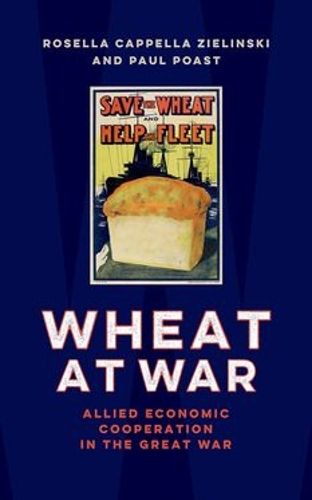Readings Newsletter
Become a Readings Member to make your shopping experience even easier.
Sign in or sign up for free!
You’re not far away from qualifying for FREE standard shipping within Australia
You’ve qualified for FREE standard shipping within Australia
The cart is loading…






The battlefields were not the only places that threatened death during World War I. As conflict raged on and supply lines tightened, the allied powers of France, Britain, and Italy faced a fundamental problem: keeping their soldier and civilian populations safe from starvation.Wheat at War describes how, faced with this immense challenge, the Allies devised a multilateral institution--the Wheat Executive--to do what no state could do alone. Rosella Cappella Zielinski and Paul Poast examine the difficult considerations made by the allied powers when ceding authority to an international body that would make decisions for them. Beyond successfully managing wheat shipping and distribution, they argue, the Wheat Executive proved to have significant influence in the evolving landscape of interstate cooperation. As a case study, the Wheat Executive improves our understanding of international institutional design, the importance of commodities during wartime, economic coordination amongst wartime coalition members, and the legacies of international cooperation during the First World War. As one of the first great experiments in supranationalism, the Allies' management of wheat while at war provides lessons about the emergence of international organizations and their contours.
$9.00 standard shipping within Australia
FREE standard shipping within Australia for orders over $100.00
Express & International shipping calculated at checkout
The battlefields were not the only places that threatened death during World War I. As conflict raged on and supply lines tightened, the allied powers of France, Britain, and Italy faced a fundamental problem: keeping their soldier and civilian populations safe from starvation.Wheat at War describes how, faced with this immense challenge, the Allies devised a multilateral institution--the Wheat Executive--to do what no state could do alone. Rosella Cappella Zielinski and Paul Poast examine the difficult considerations made by the allied powers when ceding authority to an international body that would make decisions for them. Beyond successfully managing wheat shipping and distribution, they argue, the Wheat Executive proved to have significant influence in the evolving landscape of interstate cooperation. As a case study, the Wheat Executive improves our understanding of international institutional design, the importance of commodities during wartime, economic coordination amongst wartime coalition members, and the legacies of international cooperation during the First World War. As one of the first great experiments in supranationalism, the Allies' management of wheat while at war provides lessons about the emergence of international organizations and their contours.